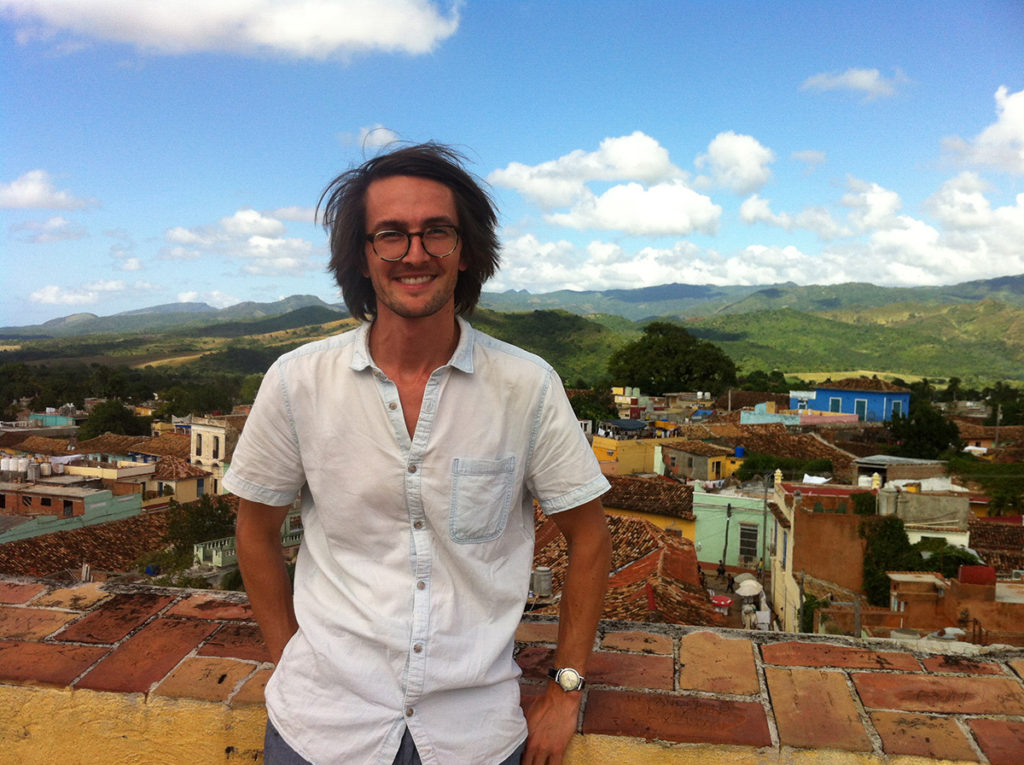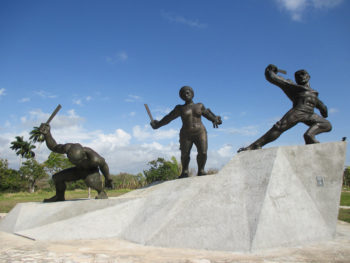Student researches Cuba’s forgotten abolitionist and civil rights journalism

Alexander Sotelo Eastman, pictured here in Trinidad, Cuba, will continue his
research on the Cuban black press at Dartmouth College as a postdoctoral member of the Society of Fellows, a highly selective fellowship.
It’s tough to study a nation’s racial history when that nation denies one exists.
Washington University in St. Louis student Alexander Sotelo Eastman tackled that challenge when he traveled to Cuba to study the black press of the late 19th and early 20th centuries. He wanted to explore how black publications helped abolish slavery and champion civil rights. But librarians could only shrug when he he asked for their collections of black newspapers.
“Many Cubans are hesitant to talk about things in racialized terms,” said Sotelo Eastman, who graduates Friday with a PhD in Hispanic studies. “Because of this founding myth of racial harmony — there is only one race, the Cuban race — you can’t go to the archives and ask for black press newspapers. It’s quite the ideal but that was not the lived reality. The color line was present then as it is now.”
Cuba’s identity as a colorblind society was born of the twin fight for abolition and national freedom. Only one other scholar has attempted to systematically document the black press’s role in the struggle and his book is 70 years old. Sotelo Eastman knew there was much more to learn. Using the earlier text as a starting point, he asked librarians to pull specific articles and authors. One name would lead to another and slowly Sotelo Eastman discovered a robust society of everyday citizens and prominent black intellectuals who chronicled the island’s racial inequalities and provided readers a forum where they could discuss what it meant to be black.
The work wasn’t easy. Cuba’s libraries don’t have the money to digitize these crumbling newspapers much less keep the lights on.
“There were power outages or the library would be just closed down for a day due to staffing shortages,” Sotelo Eastman said. “One library I visited was closed for three months because there were bugs eating the documents. Life can very much be a struggle for the people there.”

“Slave Rebel Monument” in Triunvirato, Matanzas commemorates the insurgent slaves who took part in a series of slave rebellions in the region in 1843. Sotelo
Eastman’s research examines the black press’ role in abolishing slavery in Cuba.
Sotelo Eastman’s interest in the power of the press was born out of his own close connection to the written word. Born in California, Sotelo Eastman is of Mexican descent but did not learn Spanish until he started high school.
“One of the main ways I learned about Hispanic culture was through books,” Sotelo Eastman said. “Some children learn about their culture by talking to relatives, but for me reading was a necessary step to dive into topics that were otherwise unclear.”
Sotelo Eastman, who attended San Diego State, considered a career in journalism but was introduced to print culture studies by his professor William Acree, an expert in Latin American literature and culture. When Acree accepted a position as an associate professor of Spanish at Washington University, Sotelo Eastman decided to earn his PhD here. He will continue his research on the Cuban black press at Dartmouth College as a postdoctoral member of the Society of Fellows, a highly selective fellowship. He hopes to publish a book on his research.
“It’s easy for people in this country, who get their information from so many different sources, to take for granted how reading practices can form identity,” Sotelo Eastman said. “I learned that today in Cuba you can expect that your neighbor has read the same article in the same paper, making Cubans very aware of the power of print and its limitations to equally represent a diversity of opinions.”
And he has learned something else.
“Black lives matter,” Sotelo Eastman said. “I use the term ‘black press,’ but that doesn’t mean that there weren’t white journalists participating or that black organizations didn’t embrace cross-racial alliances. Many voices were needed — then and now — for social justice.”
by Diane Toroian Keaggy